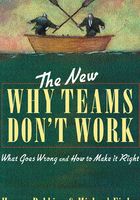
Preface
Why Teams Don’t Work surprised us. When we created the first edition in 1995, we intended it as just another book on the teams bookshelf. After all, we were just a teams coach and a business reporter, toiling somewhere in the snowy Midwest. It wasn’t logical that our book would be a hit. But, 50,000 copies and a Financial Times “Best Management Book of the Year” award and many hundreds of fan letters later, we are forced to conclude that we wrote a good book.
What’s so good about it? A consultant with a top global firm collared us in the lobby of a London hotel with her theory.
“Teams have been imposed everywhere from the top down,” she said. “You’ve got consultants selling teambuilding packages by the yard. You see executives bragging in magazines about their terrific team skills. Then there are organizational dynamics professors writing long dry papers with lots of boxes and arrows. But none of those people sound like they’ve ever actually been on a team, or know what it feels like when a team is struggling. You do. Your book,” she concluded, “is the antidote to all the others.”
We blushed. But it’s true. We’ve had team leaders come up to us almost tearfully at conferences to thank us for the bottom-up approach, and our focus on team intelligence.
Team intelligence, the linchpin concept of this book, is not the team’s IQ. (Though IQ comes in mighty handy on most teams, and lack of it has sunk many a team to the bottom of the sea.)
Team intelligence is intelligence about working together. A team that is smart about itself knows where its strengths and weaknesses are. Team members know what each of them wants and needs. They know about one another’s peculiarities, and how to get the best from one another. And they know when to stop bugging one ix another. Intelligent teams have to fight to achieve this level of awareness, and they have to fight to keep it.
Most teams, we’re sorry to say, come up short in the smart department. Some of this is the team’s fault. Team members don’t respect one another, they don’t listen, they hide what they know from one another. They act as if they are not a team, and indeed, they are only a team in name, a group of people who hold meetings. These “teams” need to either get smart ASAP, or disband.
More often teams aren’t smart because they are not set up to be smart. The organization they belong to doesn’t provide them with goal clarity, or a sensible line of command, or the tools to do the job. The team is made to live in an atmosphere so toxic and so paranoid that you can’t have a simple conversation, much less share ideas.
Poor team intelligence—about goals, about processes, about decision making, about individual team members’ needs—is why teams don’t work.
Which brings us to the title of the book. If we could correct one misconception about Why Teams Don’t Work, it would be the inference people make, from the negative-sounding title, that we lack confidence in people’s ability to work together.
In truth, we are passionate advocates for teams. We believe in people. We like people.
But we do get angry sometimes, and we do lose heart, and we do have negative thoughts when we see how brutally organizations treat teams, and how teams mistreat themselves. So often, this brutality arises not because anyone is mad at anyone else—it’s just the way things are in the organization. No one wants it to be that way, but no one can make it stop. This is team unintelligence.
If this is an “anti” book, then it is anti-betrayal, anti-lying, and anti-stupidity. We’ll accept that negativity. Why, we’ll wear it on our lapel, like a white carnation.
Remedying these team failures is the reason we wrote this excellent book. We commend it to you to get the teams you are on to work together better, and provide greater satisfaction for everyone.